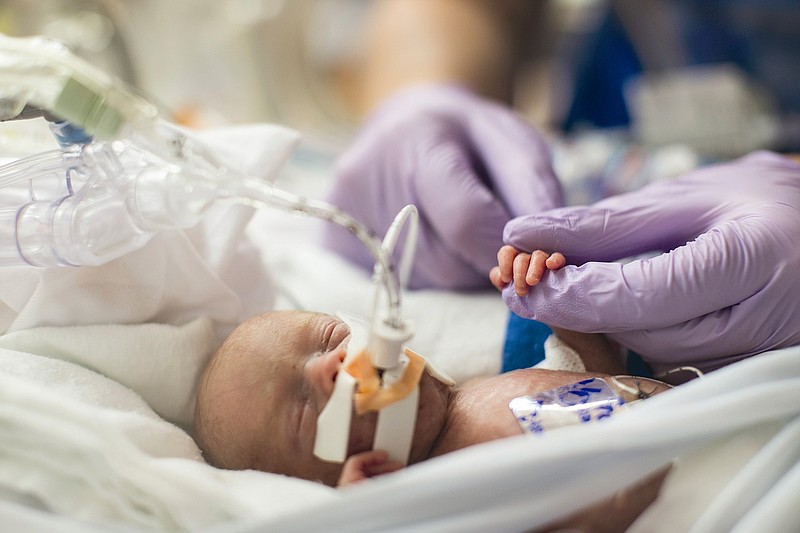The burly, bearded man dozed in a rocking chair, holding close to his chest his tiny, premature child, who was swaddled in a white blanket.
A young mother rocked her tiny baby in a catty-cornered pod. A screen provided privacy for another mother who nursed her baby.
At the far end of the nursery, I met a day-old baby, born in the 23rd week of pregnancy and weighing 645 grams. That is less than 23 ounces. Think 5 1/2 sticks of butter.
This tiniest of babies rested in a sophisticated isolette, a glass-enclosed unit loaded with an array of monitoring and therapeutic devices. A ventilator supported her respirations. Nutrition and fluids flowed through tubing inserted in her umbilical vein. A blood pressure cuff, no bigger than a Band-Aid, encircled a pipe-cleaner-thin upper arm. Crib-side monitors continuously reported all her vital functions to her personal nurse.
Highly trained and specialized nurses, nurse practitioners, neonatologists (pediatricians who specialize in the care of newborn babies) and respiratory therapists circulated among the scores of babies, a shared goal of keeping the infants safe while they gained sufficient traction in their prematurely launched lives to go home with every expectation of growing into healthy children. A fragile baby requires the full attention of a nurse. As babies gain strength, a nurse may care for two patients at a time.
I was among the inhabitants of the Neonatal Intensive Care Unit (NICU) at Children's Hospital at Erlanger. My visit to the unit last week amazed and touched me deeply. The devotion of all the adults present - staff and parents - was almost palpable.
Children's NICU can accommodate 64 premature or otherwise fragile newborn babies. An overflow can be managed in the pediatric intensive care unit. The hospital at Erlanger East has a NICU as well.
Though the space is constantly busy and cramped -staff circulating among their patients, parents occupying rockers at the foot of isolettes - Children's NICU is a peaceful place with every precaution taken to minimize noise, which can be detrimental to a baby's development. A sound-dampening blanket may be placed over a baby's unit as needed.
In 2016, 980 babies were admitted to Children's NICU. The average stay was 23 days. An infant will stay as long as necessary, sometimes months, to reach a level of maturity and stability good enough to go home. Premature babies constitute the largest group. Newborn babies whose survival is threatened by developmental defects, such as faulty heart valves or malformed digestive tracts, are managed in the NICU. Babies in drug withdrawal, born to mothers addicted to opiates and cocaine, present special challenges in care and require longer stays in the NICU.
Premature infants are susceptible to a variety of unique medical problems. Spontaneous bleeding may occur within their brains. Their severely premature lungs are vulnerable to infections. Severe inflammation may occur within their immature digestive tracts. Malformations in organs may further jeopardize their survival.
Frequent, human contact - touch and cuddling - are vital to the development of these tiniest of patients. As soon as a baby can be safely removed from the sophisticated crib she is given to her mother to nurse and to hold for as long and as often as feasible. Remarkable volunteer "huggers" come to the NICU regularly to hold and to rock babies whose mothers may be unable to be present.
The birth of a markedly premature or fragile baby represents a major disruption for the entire family. For parents in the metropolitan Chattanooga area the closeness of Children's NICU means that jobs can be maintained and care provided for other children in the family, while parents alternate shifts with their newborn babies.
Mothers and families who live more than an hour's drive from Children's Hospital may stay in the nearby Ronald McDonald House, where beds, meals and showers are provided. The facility requests a small donation from families who can afford it.
Sixteen hospitals, one in Alabama, seven in Georgia, the rest in Tennessee, are in the referral network for Children's NICU. Instruction in neonatal rescue is shared with nurses and physicians affiliated with these hospitals.
The NICU is the most expensive site to operate at Erlanger. More than 60 percent of the babies and their families are supported by Medicaid, or TennCare, as it is called in our state. Politicians who oppose traditional Medicaid and advocate replacing the program with block grants to states should visit the NICU and reflect upon the lifegiving benefits of Medicaid for so many precious babies and their parents. Any replacement of Medicaid must assure ample support for this special population who come to Children's from three states.
Contact Clif Cleaveland at ccleaveland@timesfreepress.com.

